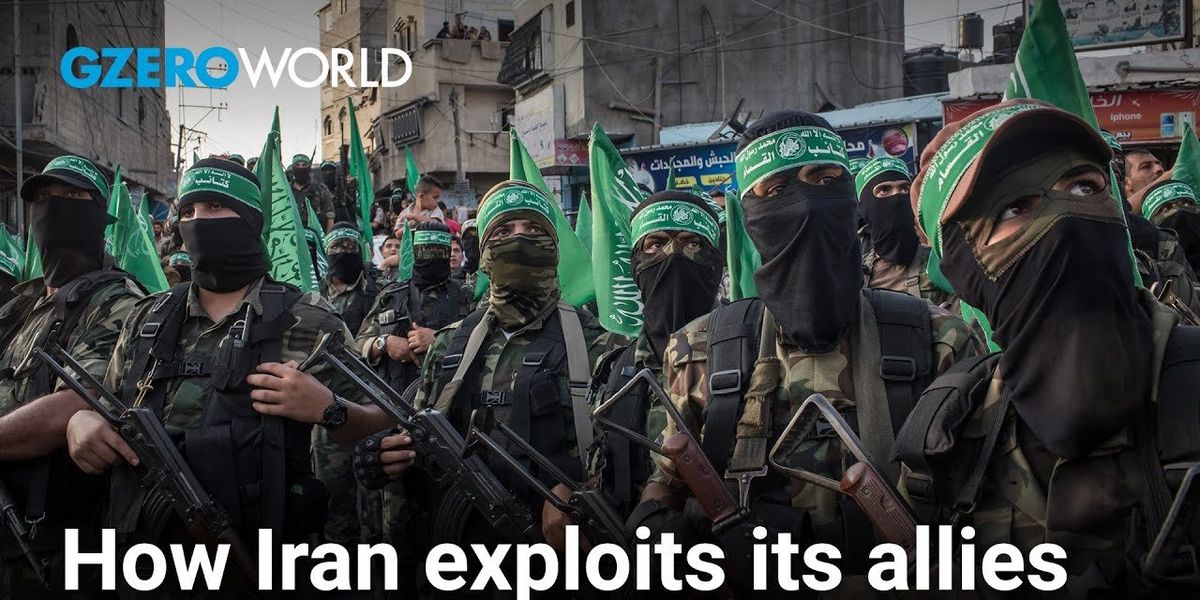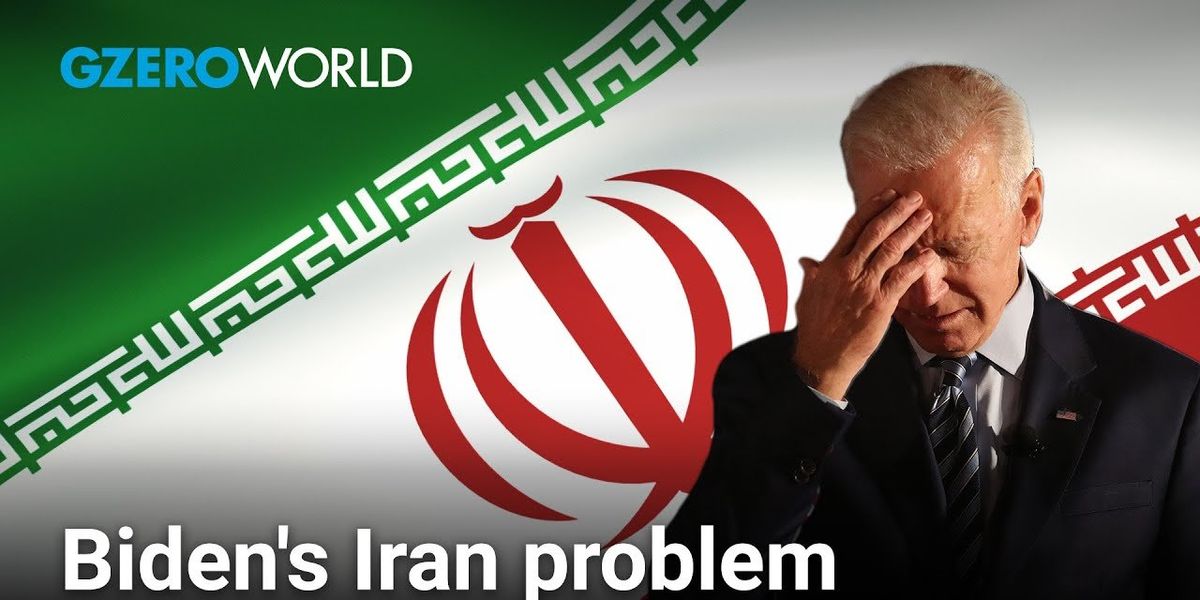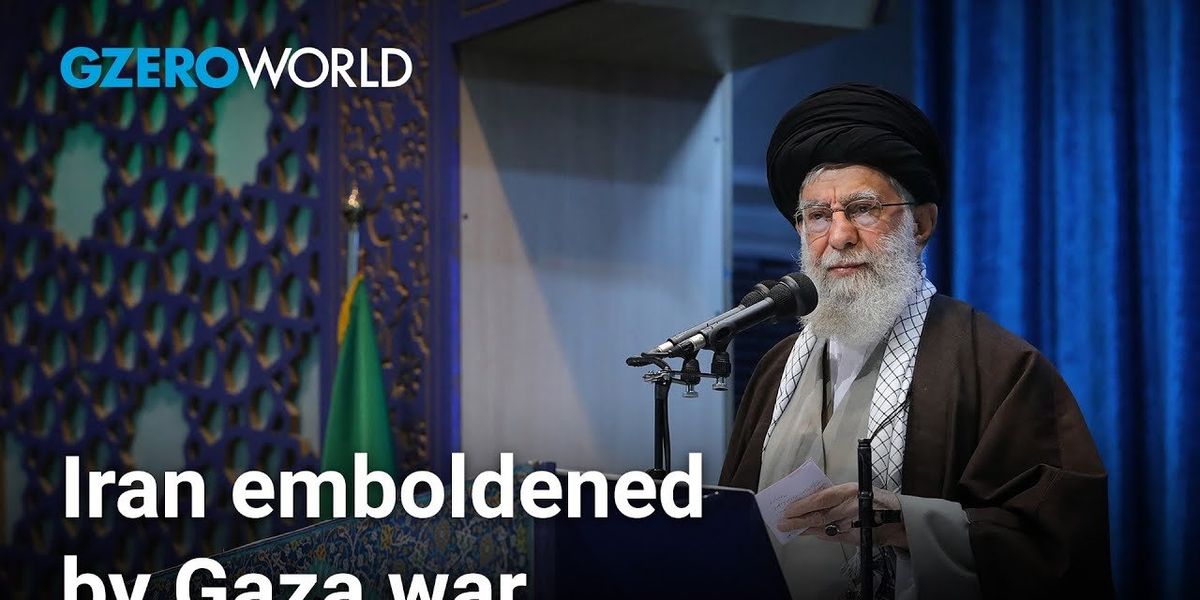Trending Now
We have updated our Privacy Policy and Terms of Use for Eurasia Group and its affiliates, including GZERO Media, to clarify the types of data we collect, how we collect it, how we use data and with whom we share data. By using our website you consent to our Terms and Conditions and Privacy Policy, including the transfer of your personal data to the United States from your country of residence, and our use of cookies described in our Cookie Policy.
{{ subpage.title }}
Iran thrives on Arab "misery," says expert Karim Sadjadpour
Whether it's Hamas in Gaza or Hezbollah in Lebanon or the Houthis in Yemen, how much control does Iran have over its proxy forces? According to Iran expert at the Carnegie Endowment for Peace, Karim Sadjadpour, Iran tends not to micromanage these groups. Iran may not typically give direct, day-to-day instructions but instead defer to these leaders to make their own decisions. However, Sadjadpour adds, on a broader level, Iran wields significant influence as they are often the primary source of funding and military support for these groups.
More importantly, when it comes to the people under the control of these proxy forces, whether they be Palestinian, Iraqi, Syrian, Yemeni or Lebanese, Iran doesn't care about their wellbeing. Sadjadpour emphasizes that we must distinguish between Iran being anti-Israel and genuinely pro-Palestinian, for instance. He recalls a conversation with an Iranian official who suggested that Iran benefits from the instability and conflict in the region, as it furthers their interests.
"Iran really benefits from the misery of these populations and these failing states, and they don't want to see these populations become prosperous" Sadjadpour tells Ian Bremmer in the latest episode of GZERO World. " And so in some ways, the more these populations experience conflict, whether it's, you know, conflict amongst themselves or direct conflict with Israel, Iran has tended to benefit from the despair of these Arab populations."
Watch the full interview: What’s Iran’s next move?
Catch GZERO World with Ian Bremmer every week at gzeromedia.com/gzeroworld or on US public television. Check local listings.
- What we know (and don't know) about Iran's role in the Israel-Hamas war ›
- US braces for Iran-backed blowback ›
- Fight between US and Iran’s proxies reaches boiling point ›
- Podcast: Iran's role in the Gaza war: is escalation inevitable? ›
- What’s Iran’s next move? ›
- US-Iran tensions complicate Biden's Middle East strategy - GZERO Media ›
Biden team struggles to define clear Iran strategy
Joe Biden may be one of the most experienced foreign policy presidents in recent history, but even he might admit that, at the moment, his administration is lacking a coherent Iran strategy. According to Iran expert at the Carnegie Endowment for Peace, Karim Sadjadpour, the White House's primary aim before October 7th had been to revive the Iran nuclear deal, but that hasn't materialized. Instead, the situation has become more escalatory, which is undesirable for both the US and Iran. Sadjadpour acknowledges that Iran may choose to advance its nuclear program and increase attacks on U.S. forces and Israel if they believe the Biden administration is averse to conflict. And it helps the American popular support for another Mideast war is near zero.
"The challenge that the Biden administration faces is that, on the one hand, they want to avert conflict with Iran, but if you want to deter Iran, you have to make clear to them there's gonna be a cost for that kind of behavior," Sadjadpour told Ian Bremmer on the latest episode of GZERO World.
Watch the full interview: What’s Iran’s next move?
Catch GZERO World with Ian Bremmer every week at gzeromedia.com/gzeroworld or on US public television. Check local listings.
Israel's war in Gaza has emboldened Iran, says Karim Sadjadpour
Since the 1979 Islamic Revolution, Iran's stance towards Israel and its Western allies has been nothing if not consistent, says Iran expert Karim Sadjadpour. In an extensive interview with Ian Bremmer for GZERO World, Sadjadpour emphasizes that Iran has consistently invested substantial resources in supporting militant groups like Hamas, Islamic Jihad, and Hezbollah in an effort to undermine Israel. It's a continuation of Iran's long-term strategy to challenge the existence of Israel.
"Iran wants to defeat the US-led world order, evict the United States from the Middle East, and replace Israel with Palestine. There's perhaps been no government with a more consistent and enduring grand strategy than the Islamic Republic of Iran."
Israel's war with Gaza has only emboldened Iran, Sadjadpour argues. But it's not yet clear whether Iran will be so emboldened as to engage in an overt conflict with Israel or the United States.
Watch the full interview: What’s Iran’s next move?
Catch GZERO World with Ian Bremmer every week at gzeromedia.com/gzeroworld or on US public television. Check local listings.
- What’s Iran’s next move? ›
- Israel at war: How will regional actors respond? ›
- Podcast: Iran's role in the Gaza war: is escalation inevitable? ›
- US braces for Iran-backed blowback ›
- Hamas attacks in Israel ignite war ›
- Iran attacks Israel - GZERO Media ›
- The view from Tehran: Iran's VP Zarif on Israel, Gaza & US complicity in ongoing conflicts - GZERO Media ›
What’s Iran’s next move?
Remember that famous line from Bill Clinton’s campaign staffer James Carville back in 1992?: “It’s the economy, stupid!” As Israel’s war with Hamas escalates, it brings to mind—in a nasally Louisiana accent—the phrase “It’s Iran, stupid.”
Because, whether it’s the dizzying arsenal of Hezbollah rockets in southern Lebanon pointed at Israel, or the Houthi drones targeting Israel from Yemen, or the Iranian Revolutionary Guard facilities in Eastern Syria-, one thing is clear: all roads lead back to the Ayatollah. And yet, there’s a big difference between skirmishes with proxy forces and an all-out US/Israel war with Iran.
"Iran feels particularly emboldened at the moment," says Iran expert Karim Sadjadpour, Senior Fellow at the Carnegie Endowment for Peace, who joins Ian Bremmer on GZERO World. "Whether it's going after Israel via proxies or going after the US via their proxies. And they may be difficult to deter because they may either correctly read the situation that the US is not interested in a conflict, or they may misread it. And that could lead us to more direct conflict with Iran."
So how close is Iran to waging war on Israel, and its Western allies? Iran is, after all, a rogue nation well on its way to developing a nuclear weapon. And that’s an escalation that no one, including Iranian leadership, wants to see happen.
Catch GZERO World with Ian Bremmer every week at gzeromedia.com/gzeroworld or on US public television. Check local listings.
- Israel at war: How will regional actors respond? ›
- Ian Explains: How Israel & Iran went from friends to enemies ›
- US braces for Iran-backed blowback ›
- What we know (and don't know) about Iran's role in the Israel-Hamas war ›
- The proxy war (still) raging in Yemen ›
- Israel's war in Gaza has emboldened Iran, says Karim Sadjadpour - GZERO Media ›
- Iran thrives on Arab "misery", says expert Karim Sadjadpour - GZERO Media ›
- Ian Explains: How Hezbollah became so powerful in Lebanon - GZERO Media ›
- GZERO World with Ian Bremmer: 2024's top 10 most quotable moments - GZERO Media ›
Podcast: Iran's role in the Gaza war: is escalation inevitable?
Listen: With all eyes on Israel’s escalating war with Hamas, what’s Iran’s next move?
Iran gets around. In Southern Lebanon, Iran-backed Hezbollah fighters have a missile arsenal that dwarfs Hamas’ rocket supply and could overwhelm Israel’s famed “Iron Dome” air defense. The Pentagon recently redirected the USS Eisenhower aircraft carrier and its strike group of destroyers to the Middle East instead of the eastern Mediterranean, ready to intercept missile and drone strikes by Iran-backed Houthi militias in Yemen aimed at Israel. Days later, American F-16 jets carried out airstrikes in Eastern Syria on facilities used by Iran’s Islamic Revolutionary Guard and its proxies, in retaliation for a barrage of recent rocket and drone attacks against American forces in Iraq and Syria.
But there’s a big difference between skirmishes with Iran proxy forces and an all-out US-Israel-Iran war. So how close is Israel to all-out war with Iran...and how will Israel’s ongoing invasion of Gaza up the ante? What are the implications for Israel's Western allies? On the GZERO World podcast, Ian Bremmer asks Iran expert Karim Sadjadpour, Senior Fellow at the Carnegie Endowment for Peace.
Subscribe to the GZERO World Podcast on Apple Podcasts, Spotify, Stitcher, or your preferred podcast platform, to receive new episodes as soon as they're published.- US braces for Iran-backed blowback ›
- Ian Explains: How Israel & Iran went from friends to enemies ›
- Skirmishes with Hezbollah threaten escalation ›
- Ian Bremmer: Understanding the Israel-Hamas war ›
- Israel's war in Gaza has emboldened Iran, says Karim Sadjadpour - GZERO Media ›
- Iran thrives on Arab "misery", says expert Karim Sadjadpour - GZERO Media ›
- Podcast: The path to a two-state solution for Israel & Palestine: Former PM Ehud Barak's perspective - GZERO Media ›
- Will Israel's war spread north? The view from Lebanon with Kim Ghattas - GZERO Media ›



